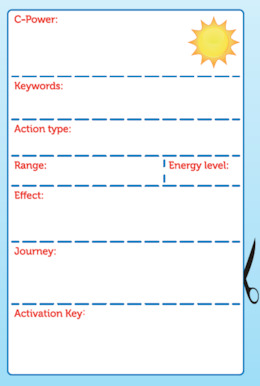Toolbox — For Training and Youth Work
All new tools in your inbox: Be the first to know about new tools for learning with our e-mail notifications.
Simulation Exercise, Exercise
C-Power Cards
A practical peer-learning approach to recognising and improving trainer’s competences in the EuroMed youth field.
Aims of the tool
- To support self-reflection on trainer’s competences
- To identify competences to be improved
- To introduce trainers’ competences in EuroMed by means of a group activity
Description of the tool
1. Participants should be familiar with the set of competences for EuroMed trainers. Distribute handouts of the competences so as to have a list of competences to select
2. Print out and distribute card templates to the participants while explaining that trainers’ performance can be changed by playing a game called Competences Power Cards to identify competences, their main features and how to increase its powers. Allow 5 minutes.
You may use the following text to introduce the activity:
The Power Cards are used by the SET (Super EuroMed Trainers) to access a variety of powers. With the aid of special Power Cards, the SET are able to control the earth’s elements to use in their help, and also give them access to amazing training moves, hi-tech tools, massive facilitation powers and the ability to combine these powers into holistic competence development to help them perform in various training contexts. Each card holds a different power. Once the card is paired, shared and discussed with other SETs, it will activate the effect of the card.
3. Explain the following card headlines on a flip board (5 minutes):
C- Power: (Choose one competence per card)
Keywords: Use max. 5 keywords to describe its practical application
Action type: What for? Identify a specific training situation
Range: Core - Common - Support - EuroMed-Specific - Other
Effect: What can I accomplish in my training by using this competence?
Present energy level: Assess your competence from 0 to 10
Journey: Which steps will/did you follow to gain this power?
Activation Key: How do/will you know you have gained it?
4. Ask each participant to fill in 3 Power Cards for competences they would like to gain or improve, and 3 more cards for competences they already have. Allow 20 minutes for individual work
5. When they have finished creating the cards, tell them to go in groups of 5 pax. max. to share the information in cards with the competences they already have.
6. If necessary ask participants to switch groups every 5 minutes (2-3 rounds) so that they can meet as many people as possible.
7. Once they have checked on the current powers, explain that the task is to find other trainers that have cards with the “Super Powers” they need and get their support to check and organise their future “training moves” to gain that competence. Each person needs to find at least 2 people that could help him/her out to gain the competence on one of the cards (25 min.).
8. Afterwards, lead them to a debriefing activity in plenary (25 min).
Debriefing
• Please tell briefly which competences have you chosen? Why have you chosen those competences?
• How many people have chosen that competence? Why? Why not?
• Did you find it easy to describe a competence?
• Why do you think they are relevant to your training practice in EuroMed?
• How can you tell that you have gained that competence? Is it the same for every one?
• Can it be related to other competences?
• Please, suggest other ways we can use the Competence Power Cards.
Adaption: This activity can be developed further into a personal action plan by identifying competences and filling in the cards to track, document and validate the learning. The activity introduces the role of the dialogue partners that can be useful in a long-term learning strategy or all the way through the training activity.
Tips: This activity is suitable to collect information on indicators for competences by checking on what trainers do to tell they have a competence. It can be applied to reach a consensus on how to recognise and assess competences. It is recommended to focus either on the core and common competences or to work directly on EuroMed-specific ones, according to the learning needs of the group.
Disclaimer
SALTO cannot be held responsible for the inappropriate use of these training tools. Always adapt training tools to your aims, context, target group and to your own skills! These tools have been used in a variety of formats and situations. Please notify SALTO should you know about the origin of or copyright on this tool.
Tool overview

http://toolbox.salto-youth.net/1529
This tool is for
EuroMed youth trainers
and addresses
EuroMed, Personal Development, Peer education, Evaluation
It is recommended for use in:
Training and Networking
Capacity Building
Materials needed:
- Power Cards templates (10 cards per person)
- Markers (assorted colours, 2-3 per pax.)
- Scissors (to be shared)
- Rulers
- Handout with the competences (2 per team)
Duration:
90 minutes
Behind the tool
The tool was created by
Juan Ratto-Nielsen
in the context of
the publication "Trainers' Competences within EuroMediterranean Youth Work" SALTO EuroMed RC, 2014.
The tool was published to the Toolbox by
Juan Ratto-Nielsen (on 22 May 2014)
and last modified
20 May 2014
Comments
No comments have been posted yet.
If you want to comment on this tool, you need to be signed in with your MySALTO account. Sign in now